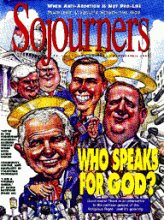'You Canadians have a funny definition of few," quipped Madeleine L'Engle as she addressed more than 100 students gathered last June in Epiphany Chapel at Vancouver's School of Theology. She had agreed to an enrollment of 24 for-credit and a few auditing students for her writing workshop titled "Story as Prayer."
The numbers affirmed the esteem in which L'Engle is held by her readers. For many, the workshop was an opportunity actually to meet their unmet mentor. Some had been reading her books since childhood, intrigued by the popular science fantasy "Time Trilogy" that begins with A Wrinkle in Time, her most famous book. Others had absorbed her books later in life, especially her autobiographies and theological writings.
L'Engle, who has written more than 40 books, dislikes being labeled as writing specifically for children or Christians. She crosses genres by writing fiction, non-fiction, autobiography, science fiction/fantasy, theology, poetry, and drama. She writes for readers of all ages and persuasions.
Whatever the literary genre, L'Engle upholds that a writer's responsibility is to radiate hope, to bring healing, to say yes to life. Her works wrestle with the unanswerable questions of life and death, God and darkness. In Walking on Water, a superb book about how faith and art influence one another, L'Engle argues that there is a "chief difference between the Christian and the secular artist-the purpose of the work, be it story or music or painting, is to further the coming of the Kingdom, to make us aware of our status as children of God, and to turn our feet toward home."
Her stories accomplish this primarily through her characters, real or fictional.
Read the Full Article
